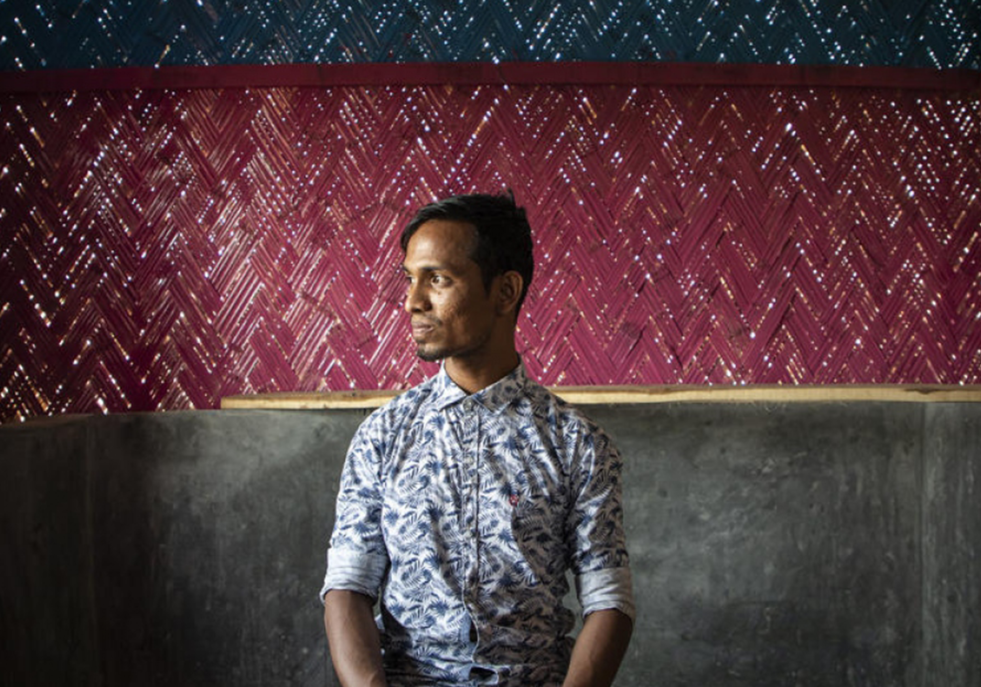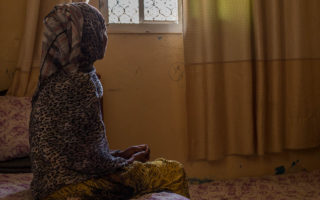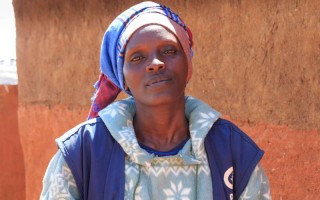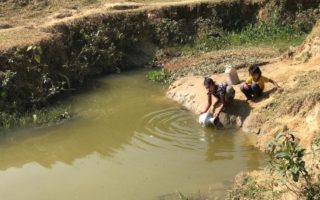
Mohammed, a Rohingya refugee role model, sits for a portrait in Cox’s Bazar, Bangladesh. © UNHCR/Will Swanson
Volunteer outreach programme in Bangladesh refugee settlements recruits men to challenge gender violence, forced marriages.
By Don Murray in Cox’s Bazar, Bangladesh
When he hears sexual insults or slurs targeting women, Rohingya refugee Mohammed challenges them.
“When we talk of sexual violence, I say to a boy, ‘You are born of a mother. You have a sister,’” he says.
“For a young man who thinks of women, I tell him to think of his mother or sister. ‘Would you want something to happen to them?’”
Mohammed is a refugee role model, one of 105 in the giant complex of refugee camps in Cox’s Bazar District, which is now home to nearly one million Rohingya refugees.
More than 740,000 of the refugees fled a military crackdown that began in August 2017, escaping atrocities and brutal violence, including rape and sexual assault.
While facing persecution and exclusion in Myanmar, the Rohingya lived in well-spaced village communities in which self-correcting traditional practices flourished.
The violent conditions under which Rohingya refugees were uprooted from their homes, coupled with the unnatural living conditions in the densely populated camps, are among the principal drivers of abusive behaviour in exile.
“Our role in this was to show how to change bystanders into change makers.”
UNHCR, the UN Refugee Agency, supports the identification, counselling and referral to services for all survivors, including men and boys.
The role model programme seeks to encourage men to challenge sexual harassment and violence in exile, and rethink complex gender issues which sometimes lead to violent disputes.
“We need to educate these young men. So we need to explain what we’re doing and what they can do,” says Mohammed, 23, another role model volunteer in the settlements, where residents are safe, housed and fed, but have few opportunities to work or study formally.
“Many of these young men say: We are useless!” Mohammed says. “Many are uneducated. They feel they can do things with a young woman … and feel they can get away with it.”
Mohammed is part of a group of five young men in their late teens and twenties, working alongside an imam in the settlement to challenge these attitudes.
The young men, who are all community volunteers, are trained to identify issues arising from domestic violence, early marriage, dowry payments, polygamy and aggressive behaviour towards women. The were trained through role-playing as perpetrators, victims and bystanders, according to UNHCR programme coordinator Jahidur Rahman.
“Our role in this was to show how to change bystanders into change makers,” Rahman says. The programme is new and, to launch it, the organizers set up meetings in mosques and community centres. The young role models were encouraged to work through sports, as a path to build trust with the community.
In a direct outreach to women and girls who make up more than half the population of the camps, a network of refugee women volunteers go door-to-door throughout the settlement. If they suspect evidence of sexual violence, they contact camp authorities and have the victim moved to a woman-friendly space.
“I heard about the discussions concerning sexual violence, and I wanted to get involved,” Imam Mohammed says.
“The camp staff asked me to identify the biggest problems in the community. From the list, I saw a major problem of child marriage, and a rising divorce rate. I sat down with community leaders, and we prepared a document for the camp authorities. I included the Holy Koran, which prohibits violence against wives, and which discourage dowries when there is no money.”
Early marriage and dowries are often linked. Parents who arrange the marriage of a daughter are relieved from supporting her, but the price is a dowry. And money in the camps is scarce. Ahmed, another role model leader, explains how the process becomes enmeshed in violence.
“Sometimes, if the dowry is supposed to be 60,000 Taka (roughly US$700), the parents can’t pay the whole amount. So they negotiate a down payment and promise to pay the rest later.”
He then describes with pride how he persuaded two families to forego a dowry to preserve harmony. “And the neighbours accepted the idea,” he says, “because it was better for the community than violence.”
That sense of pride is evident in all the young men as they describe their work in the community.
At the beginning some may have joined simply to have something to do. But now they’re part of the team, they see themselves as leaders in the community. And their work also emphasizes the importance of men in this process.
“I spend two to three hours a day working on this,” says Ahmed. “When I play football, when I see someone doing or saying bad things, I start by talking to them.”
The initial success of the programme has led to plans to expand it. The pride and persuasive skills of the young role models is helping to alleviate tensions and bring communities together, even though it will take longer to tackle the underlying causes.
Originally published by UNHCR on 24 May 2019





